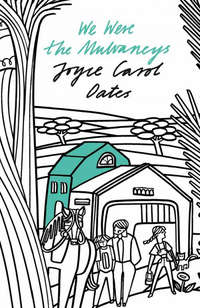
Полная версия
Mudwoman
Yet she would persevere. She would do what she could. Vastly relieved that the boy wasn’t critically—seriously—injured; impulsively deciding to drive to the hospital, to see him, at 6:20 A.M. in a wet wind-driven snow.
The hospital was a little more than a mile away from the president’s house. The last time M.R. had driven there, she’d visited an older colleague, a woman who’d had breast cancer surgery.
Before that, a male colleague, not older, who’d had prostate cancer surgery.
Both individuals had recovered, or so M.R. was given to believe.
She would tell no one at the University about this reckless pre-dawn act—no one on her staff, no confidante or friend. Certainly not the University counsel who urged caution in all matters that might involve publicity. And certainly not her (secret) lover for whom the entire adventure of M.R.’s University presidency was an improbable phantasmagoria, tinged with folly, vanity, naïveté.
Why this was, M.R. wasn’t so sure. Maybe because the presidency, beyond even M. R. Neukirchen’s brilliant academic career, was so very alien to him and so excluded him.
In a haze of excitement fueled by the insomniac stress of the past several hours M.R. drove to the hospital and parked at the brightly lighted emergency room at the rear and hurried inside breathless and apprehensive—a tall anxious-eyed woman asking if a young University student named Alexander Stirk was still there, and could she see him …
By this time, Stirk had been discharged. He’d left the hospital in the company of an individual M.R. had to assume was Oliver Kroll.
“Oh, I see! And is he—how is he?”
A young Indian doctor regarded M.R. with quizzical eyes. Who was this woman? What relationship to Stirk?
M.R. introduced herself. Seeing in the doctor’s startled gaze that yes, it was something of an incident in itself, something to be remarked upon, spoken of, that the president of the University had hurried to the ER before dawn to see the badly beaten undergraduate.
With a polite smile the doctor told M.R. that Alexander Stirk had been considered well enough to leave the ER and he would tell her what he wanted her to know of his medical condition—best to inquire of him.
M.R. went away rebuked. M.R. went away relieved.
For it had been a rash act, to drive to the hospital. She wondered if it had been a foolish act.
The University counsel Leonard Lockhardt would have disapproved. This canny individual whom President Neukirchen had inherited from her canny predecessor and whose general advice to the new University president was caution.
These are litigious times, keep in mind! And this University is known to be very wealthy.
But Leonard Lockhardt would never know that M.R. had driven to the hospital before dawn. No one would ever know, including Alexander Stirk.
Naturally Lockhardt advised M.R. not to meet with the excitable young man in private. M.R. insisted she would meet with Stirk in private. Lockhardt had cautioned M.R. not to “seem to be taking sides—prematurely”—and M.R. said that of course she would be very careful about what she said. Most of all she wanted simply to speak to the boy, to console him. For he’d suffered a terrible shock—whether his account of the assault was entirely true, he had been injured. It was M.R.’s wish to console him and she believed it was her duty to console him—as a University student, Stirk was her student.
And so M.R. took care not to suggest that she didn’t believe Stirk’s story or that in any way she wished to defend the University that had, by his account, failed to protect him.
Grimly Stirk was saying that his enemies would be accusing him of fabricating the very attack they’d made on him. They’d threatened him, with worse harm.
“—think that they can intimidate me—silence me. But they will be very surprised when—”
M.R. perceived a deep hurt in the stricken boy—a woundedness like spiritual anguish. For he’d been insulted, and the insult wasn’t recent.
Difficult to believe that this was a twenty-year-old and not a boy of fifteen, or younger; seen from a short distance, Stirk more resembled a girl than a boy. He could have been no more than five feet two inches tall and could not have weighed more than 110 pounds. How painful to have made his way in school, being so very bright—aggressively bright—and in so undersized a body; how painful his early years must have been, in grade school, and middle school. Even at the University, with its rigorous academic standards, sports were a passion in some quarters; the old eating clubs and “secret societies” still dominated undergraduate social life…. And there was the sexual element: in adolescence, the predominant element.
Though it hadn’t been in M. R. Neukirchen at that age! And so perhaps sexual longing was not so predominant in this boy, either.
Sexual feeling—“desire”—had not seemed nearly so natural in M.R. as in an adolescent, as other sorts of desire.
It did seem that Stirk’s grievances against the University were long-standing—since his arrival as a freshman. What had “come to a head” the other night had been “long building, like an abscess”—the “hostility, hatred” of his enemies—their “jealousy” of his position on campus and “leftist-liberal resentment” of the conservative coalition on campus, which was gaining in numbers steadily. M.R. was determined to listen to Stirk without interrupting him or challenging him but was having a difficult time following his reasoning, or his charges—the connection between the undergraduate woman who’d (allegedly) arranged for a late-term abortion and other (alleged) incidents at the University and the local chapter of the Young Americans for Freedom—and Alexander Stirk—wasn’t clear; very likely, there were relationships among certain of these undergraduates of which no one had spoken yet, that hadn’t only to do with their contrasting politics.
Stirk said he was seriously considering “granting” interviews, and of course he intended to write about the incident, not just for the campus newspaper but also on the Internet and elsewhere—even against the advice of Professor Kroll. It seemed crucial to him—before it was “too late” and “something worse” happened to him—to “expose to the media” the “hostile leftist environment” of the University….
Now M.R. did interrupt. Though she tried to speak evenly.
Saying she didn’t think it was a very good idea to go to the media so quickly, while the assault was being investigated by the police and the University committee—
“Are you threatening to censor me, President Neukirchen? Shut me up?—so that I don’t embarrass you?”
Eagerly Stirk spoke, as if he’d been waiting for M.R.’s objection. His good eye shone with a sort of sick, thrilled elation and his knees trembled and quaked in sideways movements like those of a hyperkinetic child who has been sitting restrained for too long.
“Alexander, of course not. You are free to write about this—to write about anything—of course—but—”
“But—what?”
Calmly M.R. continued. Calmly if a bit tightly she smiled. In the Quaker Meeting the ideal is clearness—clarity—out of confusion and dissension an infusion of the Light will prevail. Without ever having quite examined her beliefs M.R. seemed to believe this, or wished to believe it.
Not in her analytical/skeptical mode as an academic philosopher but in her mode as professor/president, she wished to believe in a vision of humankind as evolving toward light, truth, compassion like a gigantic flower opening—otherwise, one’s compassion, like one’s naïveté, was an embarrassment.
“—for the present time, while the investigations are going on—isn’t it wiser just to wait? It really isn’t a good idea, as you must know—to write something prematurely. Especially if you don’t want to tell your family—they would surely discover it, and be upset….”
Stirk shifted excitedly in his chair. As if M.R. had tossed a lighted match onto flammable material, immediately Stirk began speaking in a rapid stammer. “So this meeting is about—censorship! Censoring me! Threatening me with telling my family—worrying my family! Like—like this is—blackmail! Trying to censor the voice of the conservative movement on this campus! Already the leftist-liberals control the media—already you control the majority of universities—now, you are putting pressure to silence—censor—a victim—Trying to censor me—with the pretense of ‘helping’ me….”
“Alexander, please! There’s no need to raise your voice. I am just pointing out that—”
“‘Pointing out that’—vicious, immoral behavior is condoned on this campus—sexual promiscuity, drunkenness—infanticide—but revealing to the media what has happened to me—is ‘not a good idea’?”
Stirk’s voice was raised. Stirk was both incensed and gloating. M.R. was stunned by the sudden outburst.
“Are you—recording this? Our conversation? Is that what you are doing?” Suddenly M.R. knew this must be so.
But Stirk shook his head quickly—no. As if M.R. had leaned across the desk to touch him—to touch him improperly—he recoiled in his seat with a look of childish guilt, insolence. “No, I am not. I am—not—‘recording’—our conversation, President Neukirchen. Maybe you’d like to—frisk me? Call in your security cops—maybe a—strip search?”
Laughing Stirk lurched to his feet. In the commotion the aluminum crutch clattered to the floor and Stirk snatched it up as if in fear it might be taken from him. Astonished and mortified M.R. understood that, of course, this devious young man had been recording their conversation. Some sort of recording device was in a pocket of that bulky corduroy jacket.
Probably, Oliver Kroll had encouraged him. For this was our war, an early skirmish.
M.R.’s face flushed with heat. She hoped she had not spoken recklessly—said something incriminating—during the course of their conversation. In a mild panic she wondered—could her remarks to Alexander Stirk be broadcast, posted on the Web? Without her permission? Weren’t there laws regulating unauthorized tapings of private conversations? Was this in fact a private conversation? Had the University president a reasonable expectation of privacy, in such an exchange with a student? Her heart was beating painfully and her face throbbed with heat as if she’d been slapped.
Stirk said impudently, “And what if it is being recorded, President Neukirchen? I’m only trying to protect myself—no one can expect fair treatment—‘justice’—from their enemies. I will have to build my case using the weapons I can.”
M.R. was on her feet behind the massive presidential desk. M.R. who had never been known to raise her voice, to betray upset or agitation, still less anger or dislike, staring at the smirking boy as if she’d have liked now to hit him.
“You weren’t really ‘attacked’—were you? You’ve fabricated the entire incident—you injured yourself—filed a false report to the police—”
Hotly Stirk protested: “I did not. How dare you—insult me—slander me! How dare you accuse me of—‘fabricating’—”
“Well—did you? You did.”
Never once in this austere presidential office—not once in her months—years—at the University—had M. R. Neukirchen spoken in so uncalculated a voice, with such vehemence; never once had her face betrayed any emotion so extreme as annoyance, still less dislike, repugnance. The effect upon Stirk was immediate—his pinched little boy’s face contorted with rage and in a sudden tantrum he overturned the chair in which he’d been sitting.
M.R. cried angrily, “Stop! Stop that! You aren’t a child!”
M.R. cringed as Stirk lifted the crutch to strike at the desk, or at her—he swept a stack of documents onto the floor—a small ceramic bowl containing pens, paper clips—M.R. tried to grab the crutch, to wrench it from Stirk’s fingers—Stirk gave a loud yelp as if she’d struck him—a yelp as of surprised pain—“Hey! Jesus! What’re you doing—that hurts”—for the benefit of the recording device in his corduroy jacket.
“But I didn’t—I didn’t—”
“Didn’t what, President Neukirchen? Hit me? You didn’t—hit me?”
As M.R. stared in astonishment the gloating boy stuck his tongue out at her. His tongue! Within these swift and irretrievable seconds the conversation M.R. had believed so forthright had shifted to farce, and President Neukirchen was the butt of the farce. Quivering with mischief Stirk fitted the crutch into his armpit and turned to limp out of the office just as the door was being opened by the president’s secretary whom he pushed aside with the crutch, laughing—“Here’s a witness! Another female! Expect a subpoena, lady!”
Limping noisily and conspicuously through the president’s outer office Alexander Stirk departed historic Salvager Hall like a sequence of mallet strokes against a just barely unyielding hardwood floor.
So it would be shortly charged: not only had M. R. Neukirchen tried to “censor” Alexander Stirk, the woman had actually—in some sort of “scuffle” in the president’s office—struck him.
In some versions of the lurid story, she’d struck him with the injured undergraduate’s very crutch.
Should have known. Hadn’t she been warned.
This is a war. There are enemies.
Her heart beat in her ears. Barely she could hear the man addressing her, in an air of scarcely concealed exasperation.
Lockhardt had been chief counsel for the University for more than thirty years. Presidents of the University had inherited him as they’d inherited the presidential office itself—its austere furnishings and leather-bound books, the portrait of grim Reverend Charters above the fireplace mantel. Lockhardt’s manner was unapologetically patrician—he had virtually no presence in the consciousness of the University faculty but his presence was essential to the board of trustees who looked to him as the president’s key adviser, beside whom the president could seem but a temporary and expedient hireling.
Before taking office M.R. had imagined that she might encourage Leonard Lockhardt to retire and in his place she’d hire a younger attorney of her own generation and liberal convictions but as soon as she’d become president M.R. had known how she needed the man, his experience, his influence with trustees and “major” donors. He’d graduated from the University with a degree in classics in 1955 and he’d gone to Harvard Law and like most graduates of his generation he’d been opposed to the appointment of a female president at the University, though M.R. wasn’t supposed to know this.
He was a bachelor. His long lean cheeks were clean-shaven and he exuded an airy sexless good cheer in all weathers. He wore suits tailored for him in Bond Street, London, long-sleeved linen and cotton shirts, bow ties. Can’t trust a man who wears a bow tie M.R.’s father Konrad Neukirchen used to say but M.R. had no choice, she had to trust her chief legal counsel whose thinning silvery hair was styled in swirls like wings rising from his high forehead. In the lapel of Leonard Lockhardt’s pinstriped suit was the small gold coiled-snake insignia of the University’s most selective eating club, to which he’d belonged as an undergraduate and which had barred from membership all categories of individuals except heterosexual Caucasian-Christian males from “good” families until, begrudgingly, the mid–1980s.
M.R. had hoped to become so friendly with Lockhardt, she could suggest to him in the most casual of ways that it wasn’t a good idea to continue to wear that particular eating-club pin at the University and Lockhardt would understand and cease to wear it at such times. But this intimacy hadn’t yet happened and by late winter of 2003 M.R. had come to understand that very likely, it would not happen.
Gradually and in his gentlemanly manner Lockhardt had become adjusted to the female president. He was not the sort of civic-minded individual who bears grudges—as soon as M. R. Neukirchen had been chosen by a majority of the trustees as the most exemplary of all candidates for the presidency despite her relative inexperience, Lockhardt was committed to her. He had come to like her as a person, whom he called “Meredith”—for “M.R.” seemed silly and pretentious to him, inappropriate for a female—and to admire her style of leadership which was perilously close to no style at all—just the woman’s unfettered personality. Neukirchen was guileless, zealous, far more intelligent and sharp-witted than she appeared. Shrewdly he’d sized her up as an indefatigable workhorse—one to be exploited. That the University had inaugurated its first female president in nearly 250 years was a glorious banner unfurled and flapping in the wind for all to behold.
And so Leonard Lockhardt was anxious on Neukirchen’s behalf, and on behalf of the University, which he loved. When M.R. had had her “accident” in October—en route to deliver a keynote address at a convening of the American Association of Learned Societies at Cornell University—when she’d failed to show up at the banquet hall, and had gone missing overnight, to the great alarm of her colleagues, friends, and the conference organizers—it had been Leonard Lockhardt who’d explained the situation to the trustees and assured them that M.R. hadn’t behaved in a way at all irresponsible or eccentric, whatever he’d privately thought.
To M.R. he’d been politely solicitous. He had not asked her, as others had not, why she’d been driving—alone—in a rented car—in rural Beechum County so far from Ithaca, New York—and not even near Carthage, which was her hometown; why she’d departed the Cornell hotel without informing anyone, even her assistant who’d been desperate—frantic—for hours when M.R.’s whereabouts were unknown. He hadn’t told her as perhaps he might have that she’d behaved not only irresponsibly and in an eccentric fashion but dangerously. You might have died there. Disappeared. Who would have known?
Instead Lockhardt had told M.R. that she had been “very lucky” not to have been seriously injured “in such a remote setting”—and that in the future, should she decide to drive somewhere alone, she should leave word with her staff.
M.R. replied that she believed she had left word with her assistant—a phone call, or an e-mail. She was sure.
Of that afternoon in October in Beechum County M.R. had a confused recollection. All that had happened she both recalled with painful exactitude and yet could not grasp that it had happened to her.
Or maybe—she couldn’t remember. Waking with a pounding head, a bloodied face, near-smothered by the exploded air bag and near-strangled by the safety harness—a stranger stooping above the car overturned in a ditch calling to her Hello? Hello? Hello? Are you—alive?
Lockhardt hadn’t pressed the issue of October 2002. Whatever he thought of M.R.’s utterly inexplicable behavior, whatever trustees of the University thought, or M.R.’s staff, or those faculty members who knew of her failure to deliver the keynote address at the conference in Ithaca—that period of some eighteen hours when M. R. Neukirchen seemed to have vanished—Leonard Lockhardt had not elaborated. His manner was discreet, diplomatic; he did not question motives, or even curious behavior, except as these threatened to erupt into public matters involving the University.
Now, regarding the alleged assault of the undergraduate Alexander Stirk, Lockhardt most dreaded a highly publicized lawsuit in which his superior skills would not prevail. For it was a new era, this era of “diversity”—it was not Leonard Lockhardt’s era. The University was no longer his University. The lawsuit was coming, he knew—or some similar disaster.
“Yes, you warned me, Leonard. But—I had to try, you know.”
“Had to try! Try what?”
“To communicate with Alexander Stirk. To show him that he could trust me.”
“Of course he could trust you. But you couldn’t trust him.”
Of all of her staff it was Leonard Lockhardt who could speak most forcibly to M.R. and it was Leonard Lockhardt whose good opinion M.R. craved. Sensing how Lockhardt would have preferred her predecessor in her place, who’d been a consummate politician, and no naïve female idealist to be manipulated by an undergraduate.
“Oh, Leonard. Do you think I’ve made a terrible—irrevocable—mistake?”
And she had not told Lockhardt—she would tell no one, for pride would not allow this—how, on the way out of her office, the smirking little bastard had stuck his tongue out at her.
Andre. I have to speak with you. I know that this is a difficult time for you—I’d hoped to have heard from you by now—but—something has happened here, at the University—I will explain…. I need to know—have I made a terrible—irrevocable—mistake…. Will you call me back Andre please.
Pausing before adding, with a breathless little laugh Love you so much dear Andre!
For it was possible for M.R. to utter such words at such a time. At the very end of a brief phone message, in a voice of girlish exuberance—a kind of giddy drunkenness—what could not be bluntly, unequivocally stated
Love you Andre so much. You must know.
And never with the mildest hint of reproach, or hurt—or desperation—Love you so much Andre do you love me?
Still less would M.R. dare to leave a message of unfettered emotion, yearning—Andre, when will you come see me again? Why don’t you call me? What is happening in your life? I feel so distant from you … I am so utterly lonely here….
Between them from the first—M.R. had been twenty-three, Andre Litovik thirty-seven—this had been the (unstated) agreement, the bond. M.R. would love Andre Litovik more than he loved her because M.R.’s capacity for love was greater than his as M.R.’s capacity for sympathy, patience, generosity and civility was far greater than his. I can love enough for us both. I will! M.R. had thought in the early years of their (secret) relationship but now she wasn’t so certain she could continue to retain the strength of her old loyalty.
Loyalty: naïveté.
And yet: loyalty.
But as soon as Alexander Stirk departed, and M.R. was alone again in her office stunned, humiliated, hurt—the adrenaline rush of anger had quickly subsided—she called her lover in Cambridge, Massachusetts, on her cell phone.
A (secret) call. No one among the president’s staff must know.
M. R. Neukirchen’s (secret) life. M. R. Neukirchen’s (unacknowledged) life.
No one knew, among her wide circle of friends, acquaintances, colleagues—that M.R. had been involved with a man, a married man, since graduate school in Cambridge. So many years! And so faithful to this man, who had—very likely—not been altogether faithful to her.
As long as I know that I am the one he loves. To the extent to which he can love anyone.
As no one knew how lonely M.R. was. Amid the busyness of her professional life like a sequence of blinding lights rudely shone into her eyes this loneliness persisted.
She could confide in no one, of course. In this exalted position so many of her colleagues envied.
In the president’s house, in which she was a perpetual guest. As in the four-poster brass bed to which Andre Litovik had come not once in the months since her inauguration, to sleep with her.
In fact Andre had visited the University twice in those months. He’d come for M.R.’s inauguration in April and in November he’d returned to give a lecture for the astronomy/astrophysics department and at that time M.R. had hosted a dinner in his honor at the president’s house. But he hadn’t wanted to stay overnight in this house though it was understood—it seemed to be understood—that M.R. and Andre Litovik were “old friends” from her Cambridge days.
M.R. had invited him of course—but she hadn’t pressed him.
There are guest rooms here. We have at least one guest a week, often more. You would not be—it would not seem….
She’d meant, it would not have seemed suspicious.
He’d told her no. He’d been adamant, not very gracious. He had seemed almost to dislike her, so emphatically he spoke declining her invitation.
Still, they’d managed to spend some time alone together on that occasion—but not in the president’s house, and not in the president’s bed.








